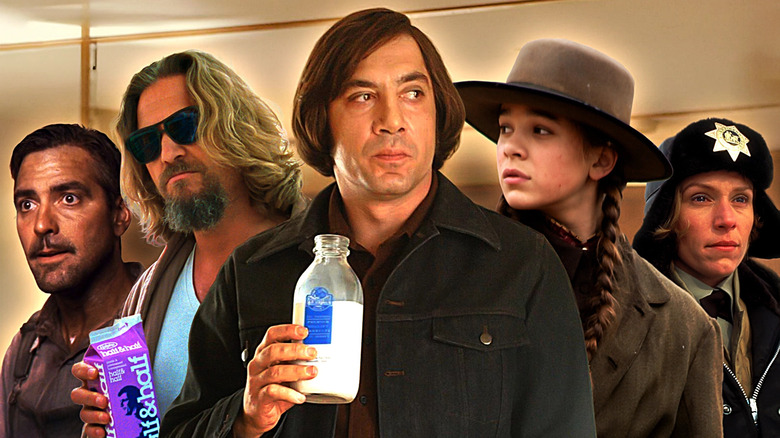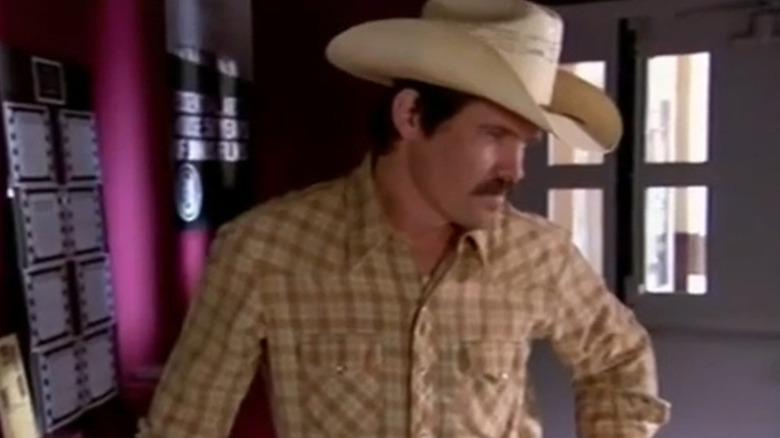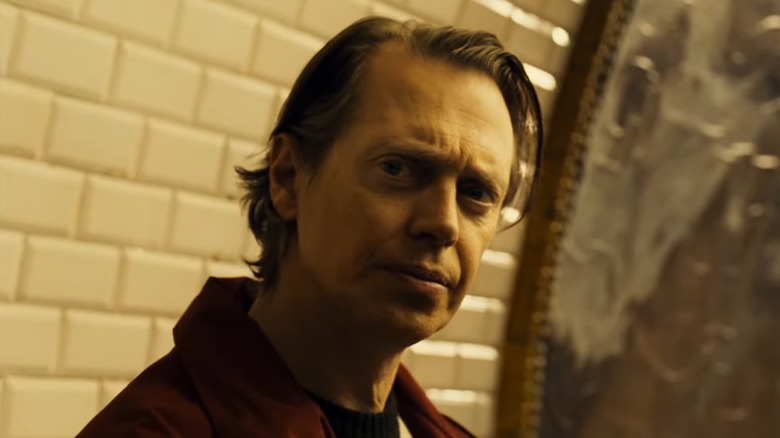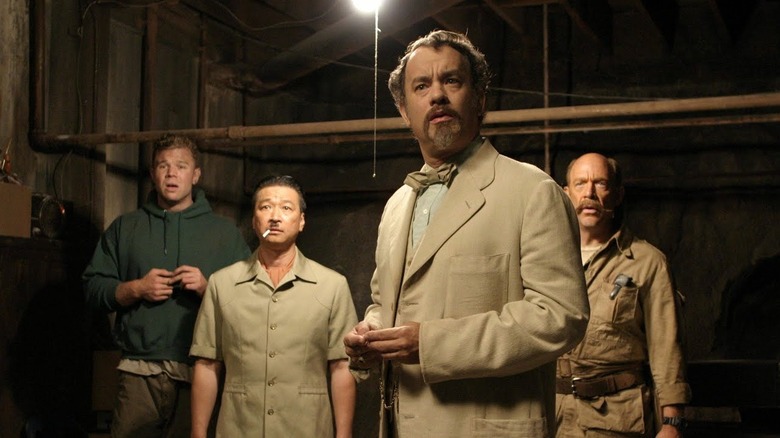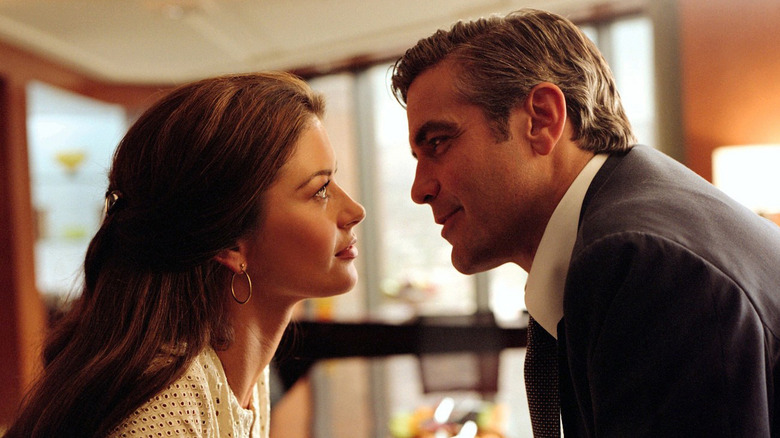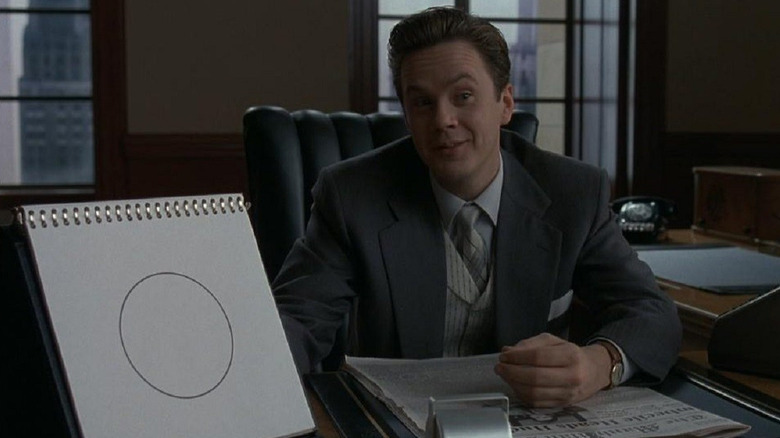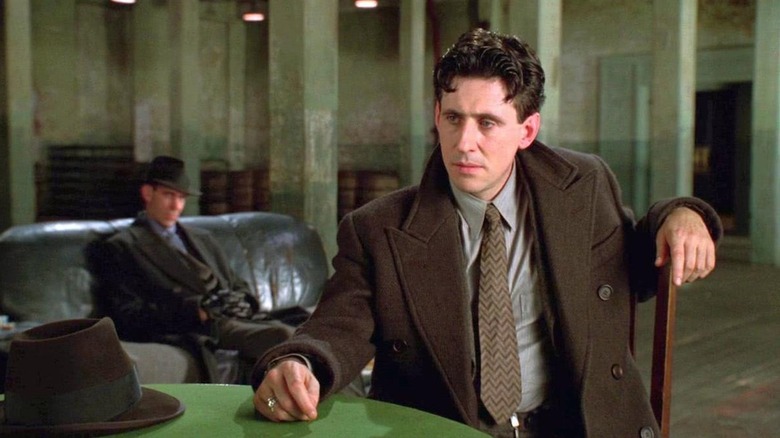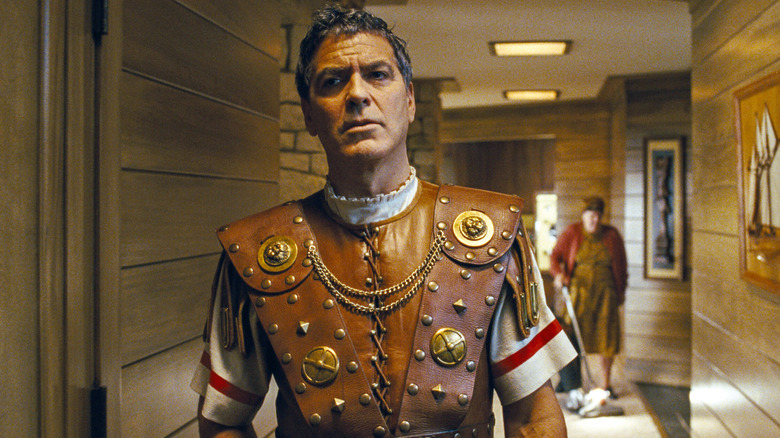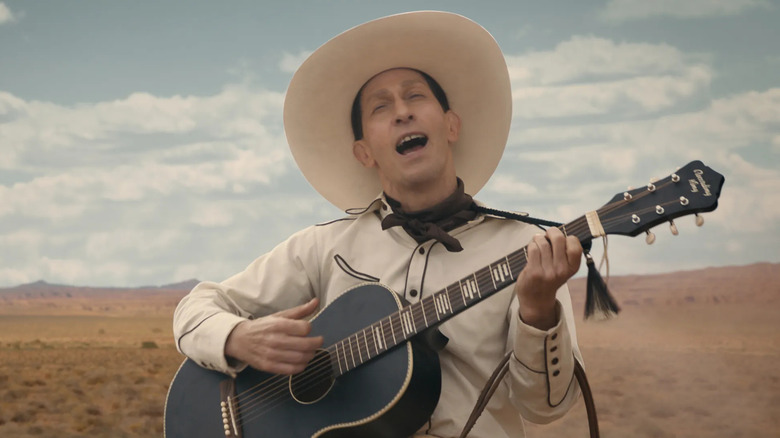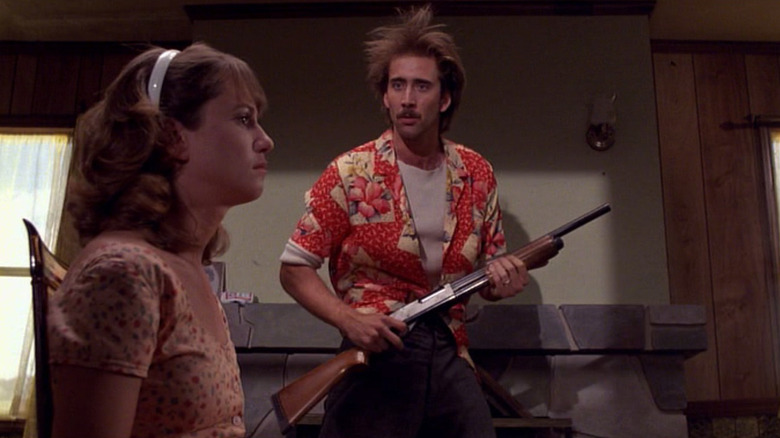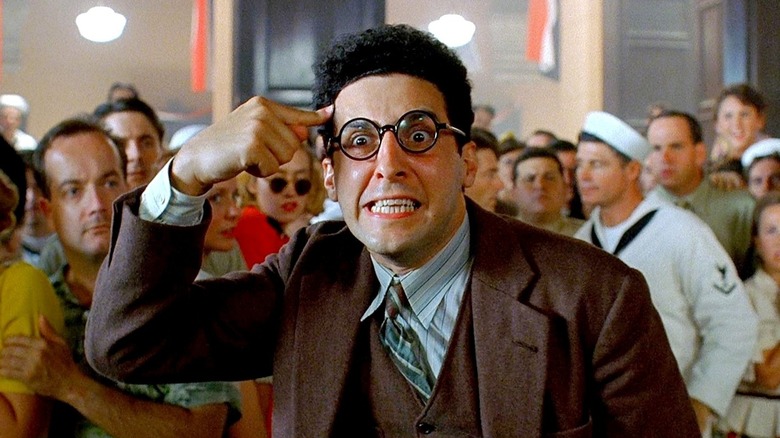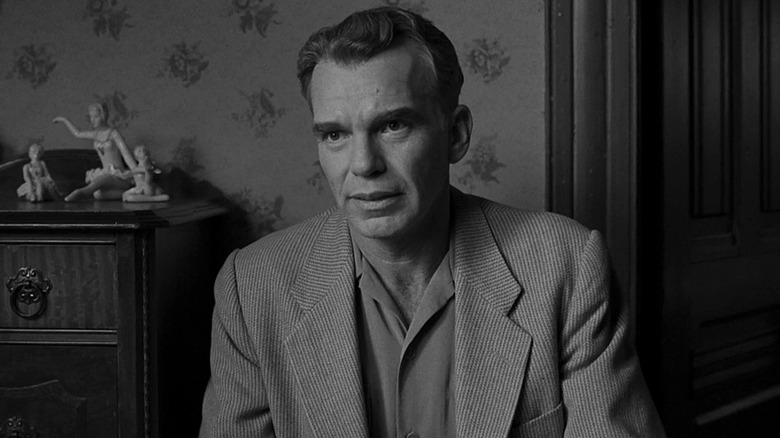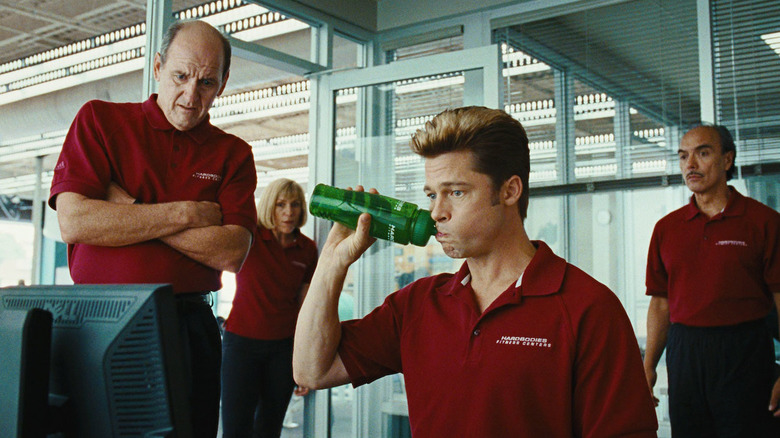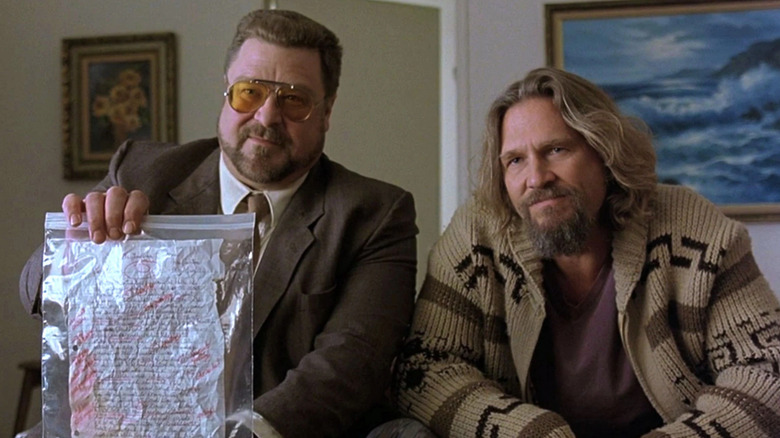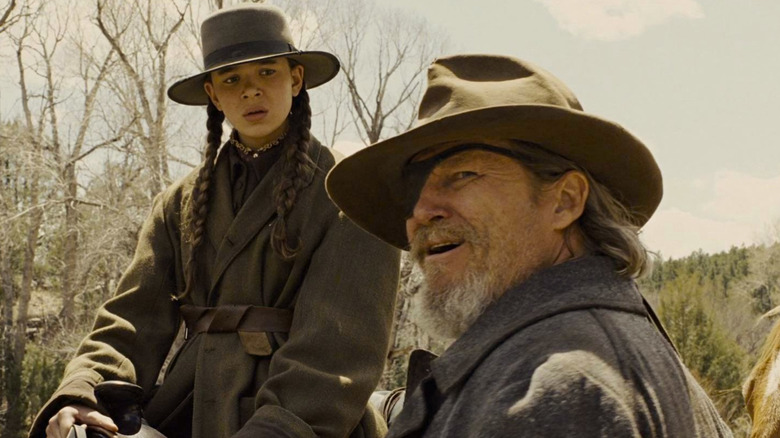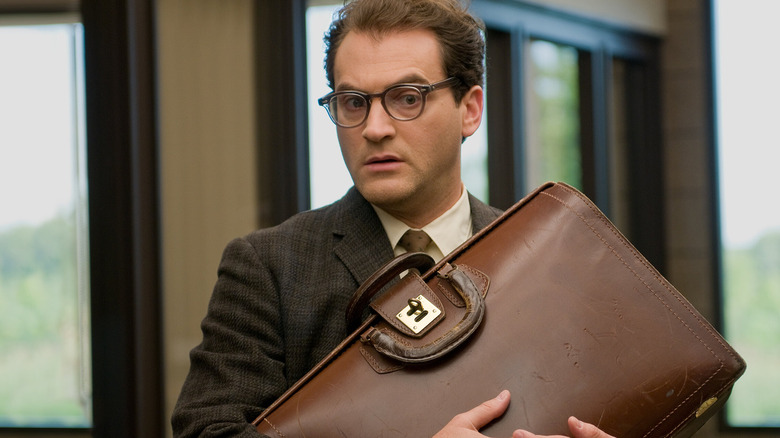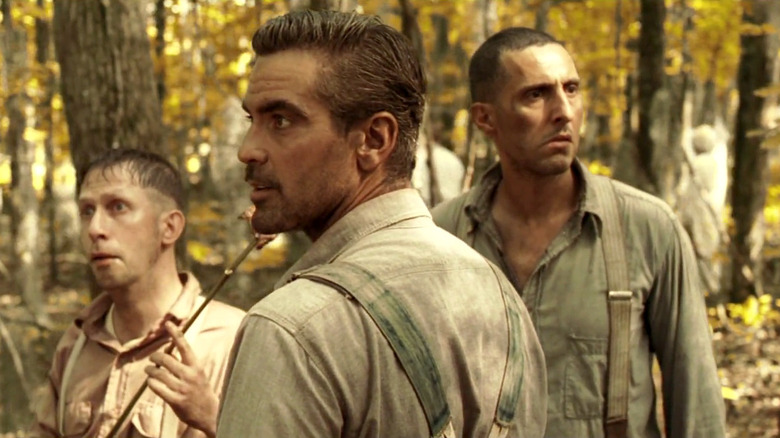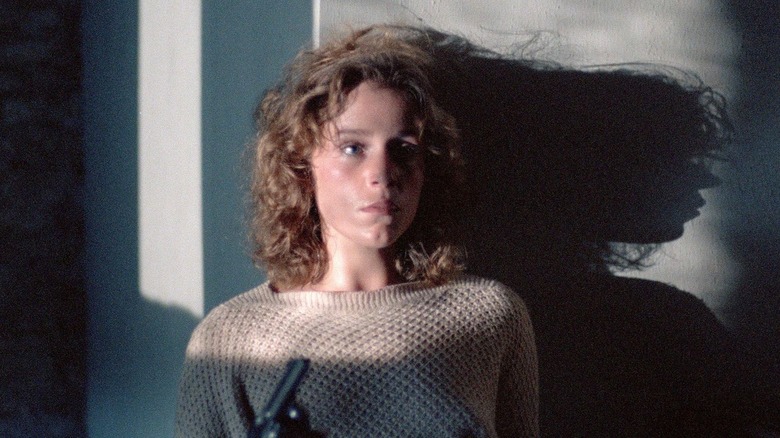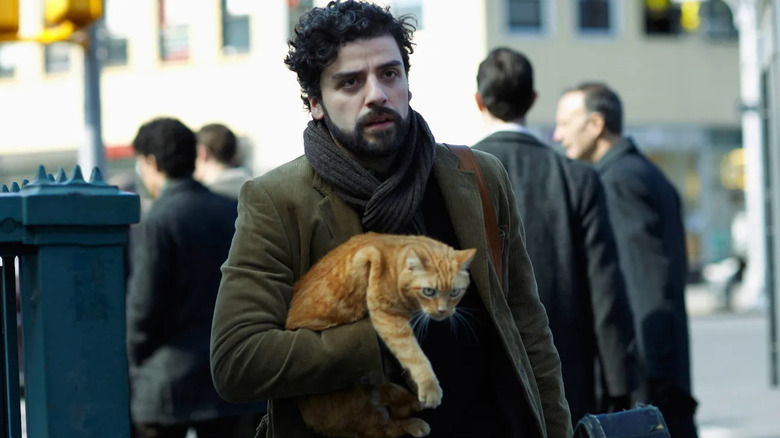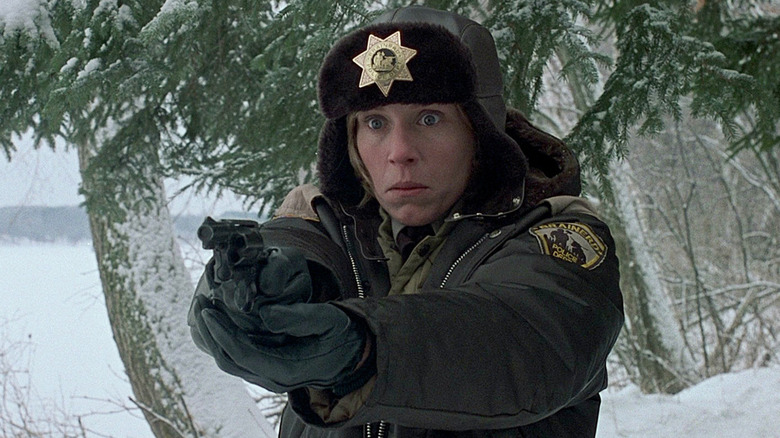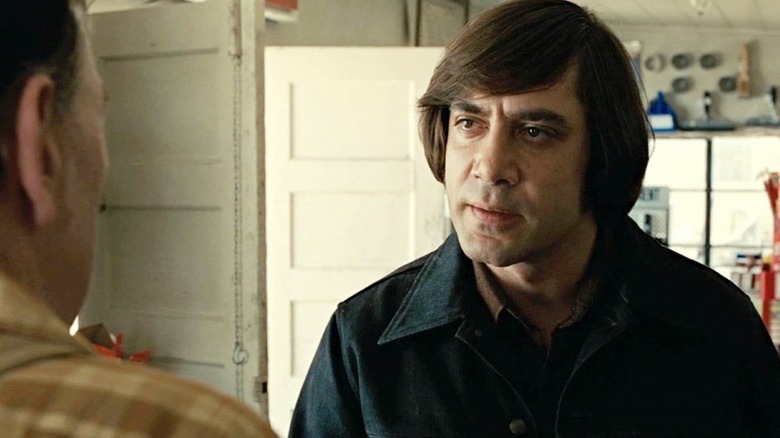All 20 Coen Brothers Movies, Ranked
Let us surely be the first to say that it's been way too long since we got a proper Coen Brothers movie. Since their 2018 anthology western flick for Netflix (that, while perfectly enjoyable, was already a massive step away from the sleek, twisted thrillers and dark comedies that made the brothers two of the most beloved filmmakers in Hollywood), the duo have gone in separate directions, writing and directing their own projects.
Joel Coen partnered with A24 and Apple TV+ for a black-and-white adaptation of William Shakespeare's "The Tragedy of Macbeth," and Ethan Coen, meanwhile, has been busy with Margaret Qualley and Focus Features making a trilogy of lesbian B-movies that has so far included 2024's "Drive Away Dolls" and 2025's "Honey, Don't!" Whatever you think of these three films, none of them come close to what the brothers achieved in their best work, some of which continue to fly way under the radar compared to the Oscar-winning efforts that defined their careers.
Here are all of the Coen Brothers' movies ranked!
20. World Cinema
Before we can dig into the Coen Brothers' feature filmography, there are two short films — both made for and released as parts of anthology films well into their careers as filmmakers — that we must discuss upfront. We understand their "ranking" at the bottom of this list may be misconstrued as a diminishment of the art of short filmmaking, but that's far from the case. Their placement is merely due to the fact that, with these two particular films, they almost cannot be compared to what the Coen Brothers' achieved on even their lesser feature length efforts.
Take "World Cinema," for example, a short released in "Chacun son cinéma" in 2007. Josh Brolin is one of just three actors in this low-budget short, in which he plays a roaming cowboy named "Dan" trying to decide which of two foreign films he wants to see at a movie theater. It's funny and fleetingly touching but not much more.
19. Tuileries (from Paris, je t'aime)
In "Tuileries" (released as part of the short film collection "Paris, je t'aime" in 2006), Steve Buscemi plays a tourist waiting at the titular Parisian subway, who spends the five-minute runtime being perplexed, entranced, and terrified of the foreign culture he's experiencing presumably for the first time. At first, his anxieties are somewhat rooted in reality — hoping to find love in the best city for it, a hand travel booklet quickly informs him that the modes of connection he took for granted are taboo and potentially dangerous in France. The longer he remains in the station, however, the more his fears border on fantastical.
"Tuileries" reveals an impressive amount about its characters and setting despite its short runtime, and Buscemi similarly accomplishes much without speaking a word. It also perfectly captures that feeling of insecurity when you're in a foreign place and feel like the smallest look could be a social transgression. Beyond that, "Tuileries" is simply amusing.
18. The Ladykillers
The first feature film to make it on our list, "The Ladykillers" arguably isn't the Coen Brothers' most polarizing flick, nor is it the one popularly considered to be their worst effort. In our view, however, it has been able to dodge such definitive placement in their filmography in large part because it's so uninteresting that there's little to say about it at all. Perhaps if it had been a bit weirder or riskier, it would have earned something of a cult following — and, in our minds, the only thing worse than a film being extraordinarily bad is a film that isn't extraordinary at all.
Tom Hanks is the film's sole saving grace, starring as Goldthwaite Higginson Dorr, an affable and seemingly upstanding academic who charms his way into the home of Christian widow Marva Munson (Irma P. Hall). Though the two are somewhat of an odd pairing, Marva takes a liking to Goldthwaite and his friends, all of whom claim to be gospel musicians. In actuality, each of them are criminals hired by Goldthwaite, who wants to use Marva's basement to execute a heist. A broad reimagining of the 1955 "The Ladykillers" starring "Star Wars" alum Alec Guinness, the Coen Brothers don't bring enough wit or quirk to make their take on the story anything more than a forgettable early-2000s comedy.
17. Intolerable Cruelty
Released the year prior to "The Ladykillers," "Intolerable Cruelty" deserves most of the criticisms we lodged at the former feature. It isn't even a particularly or offensively bad film on its own — the performances are fine, the story perfectly serviceable (if a little less than profound), and the direction almost snappy enough to trick you into thinking you're watching a Coen Brothers film. Indeed, you are — the brothers did contribute to the writing of the screenplay, and Joel Coen directed. However, what we mean to say is that, like "The Ladykillers," this is a movie so unextraordinary in almost every way that Coen Brothers fans won't be satisfied by it (in fact, if you happened to come across it with no knowledge of their involvement, you'd likely enjoy it far more).
Coen Brothers favorite George Clooney plays Miles Massey, a ruthless and nigh-sociopathic divorce attorney who takes on his most challenging case yet when the wealthy Rex Rexroth (the late "Gilmore Girls" star Edward Herrmann) hires him as counsel for his messy divorce from his wife Marilyn (Catherine Zeta-Jones). Miles quickly deduces that Marilyn only married Rex for his money, a fact which he believes he can prove in court and use to protect Rex's assets. Unfortunately, the more Miles studies this cunning would-be housewife, the more he becomes obsessively infatuated with her. This dynamic portrayed through Coen Brothers' unique style creates some amusing moments, but in general, the film as a whole feels so watered down that it's hard to remember the highlights by the time the credits roll.
16. The Hudsucker Proxy
Here, we have the last of what could be considered the "bad" Coen Brothers movies, but there are plenty of people out there who will defend "The Hudsucker Proxy" with passion. The dark comedy takes place in an alternate version of New York in 1958, where the powerful (and fictional) Hudsucker Corporation is thrown into chaos when the founder and president of the company throws himself through the window of the top floor of their Manhattan skyscraper office building.
Naturally, this shocking and tragic event creates a novel opportunity for the Hudsucker board of directors — led by the scheming Sydney J. Mussburger (Paul Newman, in one of his best roles) — to install a president they can properly push around this time. Their selection is Norville Barnes (Tim Robbins), a clueless mailroom worker with no professional experience or understanding of New York corporate politics. And yet, it's under these circumstances that Norville manages to invent what could be Hudsucker's greatest achievement yet: the hula-hoop.
Written by the Coen Brothers in collaboration with future "Spider-Man" director Sam Raimi, "The Hudsucker Proxy" is an openly ridiculous movie that will strain credulity from the moment you turn it on (which is likely why it was critically panned and commercially ignored back when it was released in 1994). That said, its singular, goofy energy is enough to make it worth a watch.
15. Miller's Crossing
At this point in our list, we transition away from assessing the genuinely less-than-great features made by the Coen Brothers to spitting the hairs of the vast, mostly brilliant filmography. As such, certain choices are bound to have some readers scratching their own heads — like our choice to start this portion of the list with "Miller's Crossing."
Essentially the Coen Brothers' take on the classic mob noir subgenre of bygone eras of filmmaking, "Miller's Crossing" is an ensemble period crime drama that follows two rival 1920s crime families as they attempt to avert or survive an impending gang war. Local Italian mob boss Giovanni "Johnny Caspar" Gasparo (Jon Polito) discovers that one of his associates — a corrupt bookie named Bernie (John Turturro) — has been robbing him blind and decides to put out a hit, only for Irish boss Leo O'Bannon (Albert Finney) — who happens to be in bed with Bernie's sister Verna (Marcia Gay Harden) — to take him in, thus creating tension between the two factions. Caught in the middle is Tom Reagan (Gabriel Byrne), a high-ranking Irish mobster who believes Bernie must be offered to the Italians to prevent bloodshed, despite the fact that Tom himself is also in bed with Verna.
Twisted if a bit contrived at points, "Miller's Crossing" is widely considered to be one of the Coen Brothers' best films in terms of visual style. Turturro is also a standout as Bernie. Otherwise, it's one of their least-enduring films for a reason, probably best enjoyed as a '90s throwback more than a transcendent masterpiece.
14. Hail, Caesar!
We here at /Film have felt for a long time that "Hail, Caesar!" does not get the credit that it deserves as a great Coen Brothers movie. In this comedy mystery throwback to the golden age of Hollywood, the filmmakers assemble a cast of rising and established talent to take viewers on a hilariously entertaining ride through movie history.
It largely centers around the troubled production of the titular movie-within-a-movie, a swords and sandals epic starring the great film actor Baird Wittrock (a fictional movie star, played by George Clooney). When he is apparently kidnapped by a group calling themselves "The Future" and held for a ransom of $100,000, "head of production" Eddie Mannix (a glorified fixer, played by Josh Brolin) is forced to strain his morals to ensure that his movie star returns to set, scandal-free and ready to film. As he does so, he comes into conflict with and/or needs the assistance of just about every power player in Hollywood, from other movie stars (three of whom are played by Channing Tatum, Scarlet Johansson, and Alden Ehrenreich) to identical-twin tabloid writers (both played by Tilda Swinton). Equal parts silly and thought-provoking, you have to really try to have a bad time watching "Hail, Caesar!"
13. The Ballad of Buster Scruggs
After "Hail, Caesar!" was released to a comparatively lukewarm reception from critics at the time, the Coen Brothers returned to the world of the western, a tried and true genre for the filmmakers by this point (though we'll get to those films much further down). However, they didn't just call up Jeff Bridges or Josh Brolin and cash the check, but instead they used the familiar setting to experiment with an anthology format that yielded mixed-but-mostly-great results.
"The Ballad of Buster Scruggs" tells six baffling stories about the heroes, outlaws, and drifters of the wild west. There's the titular story, about a singing gun-slinger played by Tim Blake Nelson; another story about a condemned bank robber (James Franco) who keeps finding himself with a noose around his neck; one even features legendary musician Tom Waits as a gold-mining prospector. As is true of any anthology film, the format itself is the biggest strength and weakness of "Buster Scruggs." Not every story is as good as the last, though none overstay their welcome long enough for that to matter. Overall, the film is a gorgeous showcase of the wide-ranging brilliance of the Coen Brothers.
12. Raising Arizona
If you consider yourself a Nicolas Cage fan who has yet to see "Raising Arizona," we're formally revoking your Cage card until you give it a watch. The iconic film actor gives one of the greatest performances of his career in this absurd 1987 comedy, which also stars Holly Hunter, John Goodman, and Frances McDormand.
Herbert (Cage) is a petty stickup man, whose brilliant scheme of brashly robbing gas stations and convenience stores with a sock over his head lands him in jail so many times he manages to win the affections of Edwina (Hunter), the policewoman who takes his mugshots. Though they make an unconventional but loving pair, they're distraught to learn that, despite their desire to have children, Edwina is biologically incapable of conceiving. In her grief, Edwina urges Herbert (attempting to keep his life on the straight and narrow after getting out of prison) to use his criminal inclinations to abduct an infant from the wealthy Arizona family for them to raise as their own.
"Raising Arizona" has remained one of the more beloved Coen Brothers flicks, especially from their early years (it even inspired the fourth season of Noah Hawley's "Fargo" anthology series). Rewatching it today, the film holds up as a delightfully weird metaphor for parenting.
11. Barton Fink
Given that the Coen Brothers wrote the screenplay in a matter of weeks while suffering from writer's block trying to finish "Miller's Crossing," "Barton Fink" is one of the most impressive films on this list. "Miller's Crossing" supporting actor John Turturro takes center stage as the titular character, a promising New York playwright swept away to Los Angeles by potential fame and fortune.
Though his initial move is broadly successful, writer's block and increasing pressure from the studio begin to eat away at his psyche. Oh, and a woman Barton slept with (Judy Davis) has gone missing and is presumed dead, and investigators are beginning to look at the struggling writer as a person of interest. To make matters worse, Barton's particular, peculiar Hollywood experience has so distorted his mental state that he can't be certain it hasn't driven him to murder.
"Barton Fink" was critically acclaimed upon its release in 1991, playing a key role in cementing the Coen Brothers as two of the most talented filmmakers working at the time. Its cryptic ending still haunts us to this day, evoking the uncomfortable moral and psychological ambiguity present in some of their best work.
10. The Man Who Wasn't There
Nowadays, Billy Bob Thornton is perhaps best known for playing the almost supernaturally evil drifter-slash-hitman Lorne Malvo in the first season of Noah Hawley's "Fargo" series, a role which earned the actor widespread acclaim, his first Primetime Emmy Award nomination, and a career resurgence that continues today with projects like Taylor Sheridan's "Landman." Casting Thornton as Malvo was genius, not only because he brought a chilling congeniality to the role, but because he's responsible for one of the greatest performances in the entirety of the Coen Brothers' filmography.
In "The Man Who Wasn't There," Thornton stars as Ed Crane, a mild-mannered barber who lets life happen to him haircut to haircut. When an opportunity to escape this monotony emerges in the form of a potential sure-fire investment, Ed breaks bad and blackmails his wife's (Frances McDormand) boss Dave (James Gandolfini) by anonymously threatening to expose their affair. Of course, this sets off an unexpected chain reaction of crime and death, forcing an once average man to wrestle with the consequences of his actions, good and bad. In a career-best performance, Thornton perfects the quintessential Coen Brothers antihero, echoes of whom can be felt in the very series that revived his career.
9. Burn After Reading
Speaking of the classic Coen Brothers blackmailing plot, the filmmakers took their favorite storyline to another level with the 2008 black comedy "Burn After Reading." After dominating the Academy Awards the previous year with an unparalleled dramatic masterpiece of slow-burn thrills (more on that below), their return to their trademark mixture of dark humor and uptempo comedic pacing gave audiences a bit of whiplash at the time — and the story was inherently so bizarre it scared one of the film's leading actors. And yet, on its own, "Burn After Reading" is a red-hot success, defying anyone to watch it without a grin on their face.
Brad Pitt plays somewhat against type as Chad, a dopey professional gym-bro stuck in a dead-end job. When he and his coworker Linda (Frances McDormand, of course) find a disk left mistakenly left behind by hapless CIA analyst Osborne Cox (John Malkovich), they embark on a hilariously ill-informed and unprepared mission to sell these supposed government secrets to the highest bidder — whether that's Osborn himself, his bosses at the CIA (played by J.K. Simmons and "Succession" favorite David Rasche), or foreign nationals. George Clooney and Tilda Swinton also star, rounding out the cast of this ensemble farce.
8. The Big Lebowski
Now, having dealt with the true misfires and the wide range films that are varying degrees of excellent, we get to the Coen Brothers' masterpieces — those films so untouchable that any one of them could be argued to a #1 placement on this list, depending on a fan's individual tastes. For us, though it breaks our heart somewhat to withhold any flowers from the Dude, we have to start with "The Big Lebowski."
The Coen Brothers drew on a wide variety of influences to make this 1998 crime comedy, including the film noir classic "The Big Sleep" and the true story of Jeff Dowd, but the result was unlike pretty much anything else audiences had seen at the time. Jeff Bridges stars as Jeffrey Lebowski, an amateur bowler who enjoys doing as little as possible with his life. When he is mistaken for another Jeffrey Lebowski (a wealthy philanthropist played by David Huddleston), he and his friends from the bowling alley (John Goodman and Steve Buscemi) are inspired to insert themselves into his world in an attempt to make a quick buck. "The Big Lebowski" was a bomb when it first premiered, but has since gone on to become a cult classic hailed as one of the most culturally impactful films ever made.
7. True Grit
Of the numerous, distinctly and individually impressive westerns made by the Coen Brothers, "True Grit" holds closest to the core spirit of the genre. Based on the same Charles Portis novel that inspired the classic 1969 western starring John Wayne, the 2010 feature reunites Jeff Bridges with the Coens as the vicious 19th century bounty hunter Rooster Cogburn. Cold and antisocial, he is sought after by a 14-year-old girl (a young Hailee Steinfeld in her feature film debut) who wants to hire him to bring the man who killed her father to justice.
Despite being initially apprehensive, Cogburn agrees to partner with her — and, eventually, a roaming Texas Ranger (Matt Damon) hunting the same man (played by Josh Brolin). Their adventure is wrought with danger and tragedy, though all of it is presented in the Coens' expectedly chipper style. "True Grit" is considered one of the best western films ever made, earning numerous nominations at the 83rd Academy Awards, including Best Picture, Best Director, and Best Adapted Screenplay, as well as acting nominations for Bridges and Steinfeld.
6. A Serious Man
Released amidst a string of hits from the Coen Brothers, "A Serious Man" is a relatively unknown film, especially compared to the rest of their filmography, most of which enjoys some kind of enduring cultural relevance. It's a shame, as "A Serious Man" is not only their most underrated film by far but one of their greatest narrative achievements in their entire career.
The 2009 film follows Larry Gopnik ("Call Me by Your Name" and "Dopesick" actor Michael Stuhlbarg), a physics professor struggling personally, professionally, and financially. His family is in shambles — his children stray further and further from his guidance, engaging in dangerous activities in secret, while his wife continues to pressure him for a costly divorce. Meanwhile, at his school, Larry's bosses are questioning whether or not to grant him tenure, just as one of his students attempts to bribe and then blackmail him to avoid failing a class.
This is all the set-up for a comedy, by the way, one that's as funny as it is challenging and pleasantly discomforting. Relatively simpler (stylistically speaking) compared to other Coen Brothers films of this time, "A Serious Man" is a deeply moving work that interrogates the filmmaker's obsession with morality in a more vulnerable manner.
5. O Brother, Where Art Thou?
At least until Christopher Nolan releases his adaptation next year, the Coen Brothers have arguably still made the best adaptation of "The Odyssey" so far — that is, if you don't mind that they swapped out all the Trojan horses, boats, and spears for buggies, guns, and bluegrass. The filmmakers rounded up some of their favorite actors for "O Brother, Where Art Thou?" including George Clooney, Tim Blake Nelson, and John Turturro, who play a trio of convicts fleeing a brutal chain gang in the deep south in the early-1930s.
Clooney's Ulysses Everett McGill anchors the group, who (like the Odysseus of legend) is intent on making it home to his wife (Holly Hunter) and children. Along the way, he and his cohorts make a few friends and a whole lot of enemies, meeting a trio of entrancing water nymphs, a brilliant blues musician (Chris Thomas King) who claims he sold his soul to the devil for his talent, and the unscrupulous Bible-hawker "Big Dan" (John Goodman). This musical satire was a massive hit for the Coen Brothers when it was released in 2000, raking in prime box office returns and critical acclaim and helping Clooney transform himself into the Hollywood icon we know him as today.
4. Blood Simple
It should go undebated at this point that there would be no Coen Brothers without "Blood Simple." Their 1984 debut feature film isn't just an impressively effective first effort (speaking to its technical and artistic merits) from two budding filmmakers, but a rosetta stone for the themes, ideas, and tropes that would continue to be explored and deconstructed throughout the rest of their filmography.
Stop us if you've heard this one before: A relatively "normal" man, broken by his love for a woman who secretly loves someone else, crosses the line by descending into a world of hitmen, inescapable consequences, ill-gotten wealth, and murder. Frances McDormand is with the Coens from the start as Abby, a Texas woman who falls in love with barkeep Ray (John Getz) despite the fact that he works for her husband Marty (Dan Hedaya). When Marty catches on to the affair, he hires a psychopathic private detective (M. Emmett Walsh) to kill them, only to quickly find out that he can't hope to control the evil he's unleashed on the world.
Today, the Coen Brothers consider "Blood Simple" to be the worst movie they've ever made. If you ask almost anyone else, however, they'll say exactly what we're saying — "Blood Simple" is an early high-point in the Coen Brothers' career that could be soundly argued as one of the greatest crime thrillers ever made.
3. Inside Llewyn Davis
While "Blood Simple" may seem like something of a thesis statement for the Coen Brothers' future stories, it can't be said they can only tell a tale by hitting the same beats over and over. Not after "Inside Llewyn Davis."
Oscar Isaac leads this 2013 tragicomedy, giving a star-making performance as struggling '60s singer-songwriter Llewyn Davis. Still reeling from the loss of his music partner (voiced by Marcus Mumford) and failing to build as a career a solo artist, Llewyn drifts from gig to gig in New York City, relying on favors, couches, and the kindness of the few people he hasn't alienated himself from while grieving the promise he once had. The film could be described as a "slice of life" feature, less focused on a central plot and instead able to paint an achingly beautiful portrait of dreams and desperation.
Isaac and his co-stars — including Carey Mulligan, John Goodman, Justin Timberlake, and Isaac's future "Star Wars" co-star Adam Driver — deliver incredible performances that carry the refreshingly simple plot of "Inside Llewyn Davis." Written and directed by Joel and Ethan as a pair, it feels like the most personal film in their filmography.
2. Fargo
Given how steady their progression throughout the '80s and '90s was overall, it's difficult to say for certain which Coen Brothers film is responsible for securing their place as mainstream directors in Hollywood. For our part, we'd argue that honor belongs to "Fargo," a 1996 black comedy crime film that made over $60 million against a budget of $7 million and earned the Coen Brothers more critical acclaim than they had ever experienced at the time.
Very, very loosely based on a real crime, "Fargo" follows a baffling, almost hilariously unbelievable string of murders that befall the snow-covered city of Fargo, North Dakota. Future "Shameless" star William H. Macy plays Jerry Lundegaard, a car salesman who hires two criminals (Steve Buscemi and Peter Stormare) to kidnap his wife (Kristin Rudrüd) in a laughably stupid attempt to weasel a five-figure ransom.
Of course, when the kidnapping inevitably goes sideways — and results in multiple unintended murders and a nasty fight over a $750,000 real estate investment — Jerry's simple get-rich-quick scheme mutates into a massive crime spree that attracts the sole attention of police chief Marge Gunderson (Frances McDormand). Funny, tragic, and shockingly violent, "Fargo" is the Coen Brothers formula perfected to a tee. It is arguably their most culturally-enduring work, in large part due to the acclaimed FX anthology series inspired by the Coen Brothers' entire filmography, but which primarily sources (and derives its title from) "Fargo."
1. No Country for Old Men
To some readers, "No Country for Old Men" won't just be the best Coen Brothers movie ever made. Nor will it just be the best crime thriller or western they've ever seen. For many, "No Country for Old Men" is so well-written, gorgeously shot, unsettling, memorable, impactful, and perfectly cast, that it deserves to be in the conversation for the greatest movies ever made.
Appropriately, "No Country for Old Men" was something of a stroke of luck for the Coen Brothers. Having already been fans of the late novelist Cormac McCarthy, they were essentially handed the book a year before it was published and offered the chance to adapt it into a movie. For those who have yet to see or read it, "No Country for Old Men" is a modern-day western that follows three men whose lives are impacted by a lost cartel fortune. Llewelyn Moss (Josh Brolin) absconds with the money when he finds it in the desert, knowing that he'll have to escape its rightful owners before he can rest easy with his wife; he's right, of course, as the almost supernaturally evil hitman Anton Chigurh (Javier Bardem) has been contracted to retrieve the money by any means necessary. With all this violence suddenly cropping up at once in a small Texas county, it's up to Sheriff Ed Tom Bell (Tommy Lee Jones) to prevent further bloodshed by investigating a crime spree so brutal, sophisticated, and relentless he can barely understand it.
Against a budget of $25 million, "No Country for Old Men" grossed over $171 million at the global box office. It tied Paul Thomas Anderson's "There Will Be Blood" for most nominations at the 80th Academy Awards in 2008 and left the ceremonies with Best Picture, Best Director, Best Adapted Screenplay, and Best Supporting Actor for Bardem.
